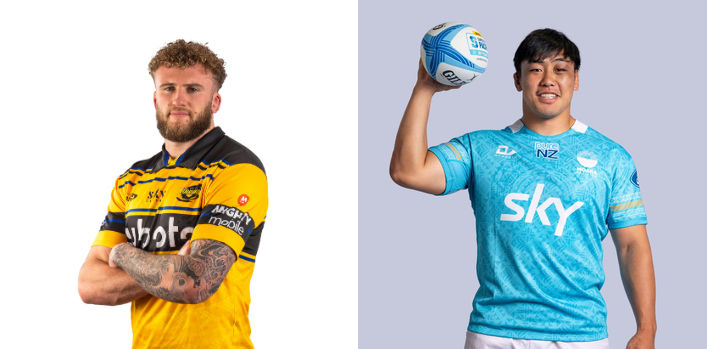The untold story of Suntory’s 2001 win over Wales
- Mark Pickering

- Jul 5, 2025
- 3 min read
Updated: Jul 9, 2025
Wales’ return to Japan, for the first time since the 2019 World Cup, will see the visitors fighting to end the worst losing streak in their history while the hosts are confident of earning their first win over a Tier 1 nation since 2019.
The head-to-head statistics between the countries makes for grim reading for Japan who have only defeated Wales once in 14 meetings between 1973 and 2016.
As their rivalry is renewed in Kitakyushu, in the first of two-match series, on Saturday, home fans will be hoping the Brave Blossoms can repeat their 23-8 win over the visitors from 2013.
That upset victory in Tokyo, which was the final game in a two-match Test series, was masterminded by Eddie Jones in his second year in the role.
However, there’s one Japanese triumph over Wales on home soil that even tops the Brave Blossoms’ first and only win over the 2019 World Cup semi-finalists.
In 2001, Wales opened their five-match tour to Japan by facing the national champions Suntory Sungoliath at Tokyo’s Chichibunomiya Rugby Stadium.
Interim head coach Lynn Howells, who stepped in for Graham Henry who was coaching the British & Irish Lions in Australia, named nine full internationals in his team including captain Stephen Jones at inside-centre and 19-year-old wonderkid Gavin Henson at fly-half.

Suntory recognised the importance of being but forward to represent the Top League against a national team, a first in Japanese rugby.
The club, which is owned and liberally funded by Suntory, a global multinational brewing and distilling company that was founded in 1899 in Osaka, embraced the occasion.
Suntory head coach Masato Tsuchida, who, almost a quarter of century later is the most powerful man in the game in Japan as the JRFU President, picked a star-laden team that included Fiji’s riveting full-back Alfred Uluinayau, former Samoa and New Zealand centre Alama Ieremia and Japan internationals including fast-rising wing Toru Kurihara and seasoned international prop Shin Hasegawa.
Wales led 24-17 at half-time but wilted in the second half in the intense heat as the hosts ran in four tries to stun their shellshocked visitors.
Captain Stephen Jones’ 77th minute penalty nudged Wales ahead 41-38 but just 60 seconds later, Suntory's Kurihara and full-back Hirotoki Onozawa combined to break through Wales’ fatigued defence before Uluinayau put through replacement wing Junichi Hojo to dramatically snatch a remarkable scalp for the Japanese club.
Hojo’s last-ditch try sent the 13,000 crowd into a frenzy as the youthful Wales side, which featured future British and Irish Lions such as captain Jones, Gareth Thomas, Gavin Henson and Gareth Cooper were humbled by Japan’s leading club side.
Try scorer Kurihara’s most vivid memory from the game was the masterful display from playmaker Keisuke Sawaki.
“Fly-half Sawaki-san's explosion is my clearest memory of the game,” Kurihara told RugbyJP.com.
“Playing with him, he was devouring Wales to the point that it was almost funny.”
Kurihara was a relative newcomer to Suntory’s first-time environment having recently joined from Keio University RFC.
The Ibaraki-born flyer, who would go on to represent Japan at the 2003 World Cup remembers being slightly overawed by the occasion.
“I was new and had only been with the team for about two months. But the team had a big target of beating Wales. I felt overwhelmed but the team believed in winning.
“We had a strong team, so it was fun.”
Teammate Hasegawa also shared his memories of one of the most famous days in the history of club rugby in Japan.
“It's been a long time so my memory is a bit hazy, but I remember it was very hot,” he told RugbyJP.
“At the time, Suntory had good members and were playing good rugby.
“Of course I thought we could beat Wales, I knew that Wales did not have a full team,” added the Kyoto-born loosehead prop who is now a forwards coach at last season’s surprise play-off outfit Shizuoka Blue Revs.
Hasegawa was quick to point out that the conditions were a major factor and that the outcome could have been different if Wales had fielded their first-choice 15.
“If Wales had had a full team and the game had not been played in such abnormal weather, I don't think Suntory would have won.
“But the fact remains that we beat Wales.”

Hasegawa, who played for the Brave Blossoms at the 2003 and 2007 World Cup’s, has fond memories of the encounter but, as a well-travelled and important player for club and country, his humble nature dictates that he has moved on from his playing days and is focused on bringing the best out of his forwards at Shizuoka.
“It's a very fond memory, but it's just one of many games.”
We asked Kurihara whether current Suntory players ask him about the day they beat Wales.
“They don’t ask,” he said (laughs).




Comments